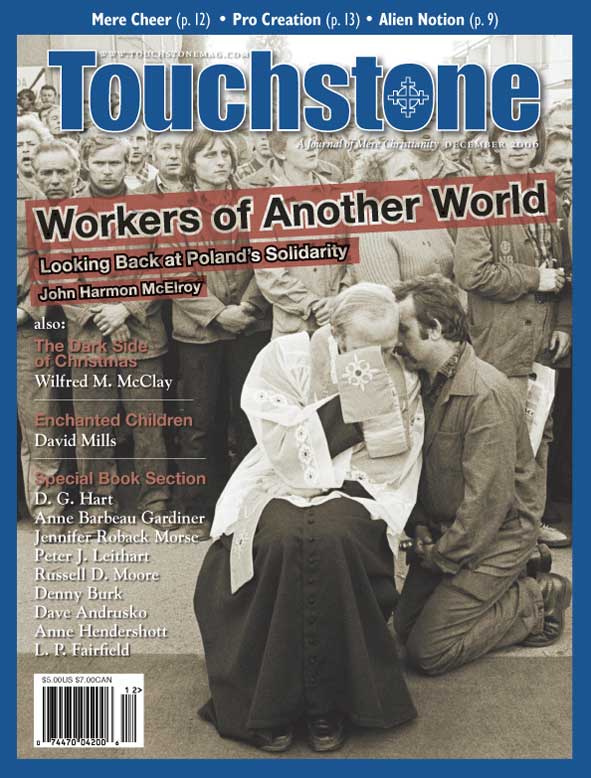Two Kingdoms Come
Toward An Evangelical Public Policy:
Strategies for the Health of the Nation
edited by Ronald J. Sider and Diane Knippers
Baker Books, 2005
(381 pages, $24.95, paperback)
The Scandal of the Evangelical Conscience:
Why Are Christians Living Just Like the Rest of the World?
by Ronald J. Sider
Baker Books, 2005
(140 pages, $12.99, paperback)
Evangelicals in the Public Square: Carl F. H. Henry, Abraham Kuyper, Francis
Schaeffer, John Howard Yoder:
Four Formative Voices on Political Thought and Action
by J. Budziszewsk
Baker Books, 2006
(218 pages, $19.99, paperback)
reviewed by D. G. Hart
The United States seems to make more sense divided than united. The Red State–Blue State analysis of the last two presidential elections is the most recent version of the abidingly useful method of splitting America in two. In the religious sphere, Evangelical Protestants are regarded as part of the conservative side in a two-party analysis of America’s political system, namely, as the religious right, and one of the Republican party’s core constituencies.
As the conservative party in American Protestantism, Evangelicals were the ones who weren’t supposed to be politically active. Applying religious teaching to public life was something liberals did through the Social Gospel (as opposed to Evangelicals’ individual gospel).
Evangelicals, believing that this world is only a temporary home, are supposed to be more concerned about the “end times,” which function as a marvelous incentive for evangelism and missions. In fact, the standard way to discredit Evangelicalism as little as three decades ago was to point out the movement’s political quietism.
And yet, as fast as it will take the Lord to return, Evangelicals became political junkies, even setting aside one entire Lord’s Day to raise a united voice not to the God who rules the universe but against judicial activism. Just as quickly they became a crucial piece of the Republican party’s electoral success. This image of an otherworldly soul animating a politically activist body is perplexing.
Individual Readings
The three books under review shed some light on the sources of this conundrum.
Toward an Evangelical Public Policy, edited by Ron Sider of the Evangelical left and Diane Knippers of the Evangelical right, is a collection of essays by Evangelical academics, church leaders, and activists that attempts to provide a theologically explicit rationale for the National Association of Evangelicals’ (NAE) new statement, “For the Health of the Nation” (also included in the book), on Evangelical participation in public life. Among the authors are Princeton’s Max L. Stackhouse, Yale’s Nicholas Wolterstorff, Fuller Seminary’s Glen H. Stassen, and the NAE’s Richard Cizik.
D. G. Hart works for the Intercollegiate Studies Institute (www.isi.org) and is an elder in the Orthodox Presbyterian Church. He is the author of A Studen't Guide to Religious Studies (ISI Books) and John Williamson Nevin: High Church Calvinist (P&R Books).
subscription options
Order
Print/Online Subscription

Get six issues (one year) of Touchstone PLUS full online access including pdf downloads for only $39.95. That's only $3.34 per month!
Order
Online Only
Subscription

Get a one-year full-access subscription to the Touchstone online archives for only $19.95. That's only $1.66 per month!
bulk subscriptions
Order Touchstone subscriptions in bulk and save $10 per sub! Each subscription includes 6 issues of Touchstone plus full online access to touchstonemag.com—including archives, videos, and pdf downloads of recent issues for only $29.95 each! Great for churches or study groups.
Transactions will be processed on a secure server.
more from the online archives

33.2—March/April 2020
Christian Pro-Family Governments?
Old & New Lessons from Europe by Allan C. Carlson
calling all readers
Please Donate
"There are magazines worth reading but few worth saving . . . Touchstone is just such a magazine."
—Alice von Hildebrand
"Here we do not concede one square millimeter of territory to falsehood, folly, contemporary sentimentality, or fashion. We speak the truth, and let God be our judge. . . . Touchstone is the one committedly Christian conservative journal."
—Anthony Esolen, Touchstone senior editor









